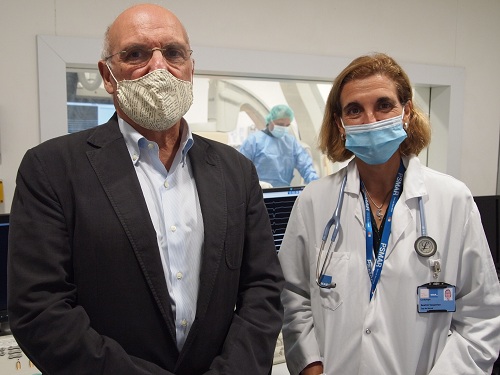
07/10/2020 - Covid-19
Doctors from the Cardiology Service at Hospital del Mar together with researchers from the Hospital del Mar Medical Research Institute (IMIM) and CIBERESP have identified two cardiac damage markers as elements for diagnosing risk in patients suffering from COVID-19. 1 in 3 patients analysed in the study had at least one of these indicators in their blood. Mortality and the need for mechanical ventilation was higher in these patients than in those who did not have it, almost 40% compared to less than 10%. 80% of the patients who died had elevated indicators of cardiac damage. This is the most extensive study published on the subject so far, with 872 patients analysed. The article has been published in the Revista Española de Cardiología.
Two cardiac damage markers can be used as predictors for the risk of complications in patients diagnosed with COVID-19. This has been revealed by the most ambitious study carried out to date in this field, led by doctors and researchers from the Hospital del Mar and the Hospital del Mar Medical Research Institute (IMIM), as well as CIBER Epidemiology and Public Health (CIBERESP). The paper has just been published by the Revista Española de Cardiología.

El Dr. Jaume Marrugat i la Dra. Beatriz Vaquerizo
The research was led by Dr. Beatriz Vaquerizo, head of the Cardiology Service at the Hospital del Mar and a collaborating researcher and in the IMIM's heart disease biomedical research group, and Dr. Jaume Marrugat, director of the Cardiovascular Epidemiology Programme at CIBERCV and head of the REGICOR group. Their goal was to validate whether two blood markers of heart damage, the troponin-T (hs-CTnT) protein and brain natriuretic peptide (NT-proBNP) could also be used as risk predictors in patients infected with the SARS-CoV-2 coronavirus.
Dr. Vaquerizo points out that "in the event of a new outbreak, analysing these cardiac markers through a simple blood test upon admission would enable us to select those patients with the highest risk of complications, and consequently optimise the therapeutic strategy early on." Demonstrating this relationship would allow us to improve the diagnosis and treatment of patients with a higher risk of mortality and the need for mechanical ventilation.
Present in 1 in 3 patients
The researchers analysed data from 872 patients diagnosed with COVID-19 at the Hospital del Mar between 27 February and 7 April this year. In 651 of these patients it was possible to carry out a cardiac marker analysis. In the blood tests carried out on admission to the hospital, 34.6% and 36.2% of them were found to have high levels of troponin-T and NT-proBNP, respectively. A relationship that, according to Dr. Marrugat, "indicates that these markers that we found, which predict a worse evolution of COVID-19, were already elevated on admission, suggesting the existence of early heart damage in a third of the COVID-19 patients admitted to the hospital."
The mortality rates and the need for mechanical ventilation in patients with these high numbers of markers were much higher than in those without them. In the case of troponin-T, this was 39.1% compared to only 9.1%, and for NT-proBNP, it was 42.6% compared to 6.8%. "This illustrates the ability of these two markers to identify patients who will suffer a worse COVID-19 progression", points out Dr. Vaquerizo. At the same time, these patients showed worse trends in other aspects. 62% needed some kind of help to breathe, and 7% needed mechanical ventilation. Their hospital stay was 9 days and 12% died.
Patients with less severe symptoms or who could be treated at home did not present cardiac damage, for which reason the researchers conclude that this is an important element in the patient's prognosis as well as when treatment is initiated. A quarter of those who needed hospitalisation but not respiratory support suffered heart damage, rising to a third in those who did need respiratory support but not mechanical ventilation, and half in those who did. More than 80% of the patients who died in hospital had heart damage.
Reference article
Markers of myocardial injury in the prediction of short-term COVID-19 prognosis. Marcadores de daño miocárdico en la predicción del pronóstico a corto plazo de los pacientes con COVID-19. Revista Española de Cardiología (English Edition) Available online 29 September, 2020. https://doi.org/10.1016/j.rec.2020.09.011
Servei de Comunicació:
Marta Calsina Freixas(ELIMINAR)
Tel:
(+34) 93 316 06 80
Doctor Aiguader, 88
08226 Barcelona
© Institut Hospital del Mar
d'Investigacions MèdiquesLegal Notice and Privacy Policy | Cookie Policy | Site Index | Accessibility | Find Us | Contact